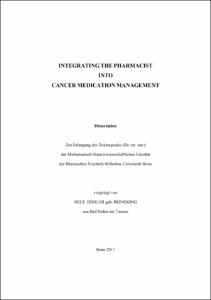Döhler geb. Reineking, Nele: Integrating the Pharmacist into Cancer Medication Management. - Bonn, 2012. - Dissertation, Rheinische Friedrich-Wilhelms-Universität Bonn.
Online-Ausgabe in bonndoc: https://nbn-resolving.org/urn:nbn:de:hbz:5N-27339
Online-Ausgabe in bonndoc: https://nbn-resolving.org/urn:nbn:de:hbz:5N-27339
@phdthesis{handle:20.500.11811/5085,
urn: https://nbn-resolving.org/urn:nbn:de:hbz:5N-27339,
author = {{Nele Döhler geb. Reineking}},
title = {Integrating the Pharmacist into Cancer Medication Management},
school = {Rheinische Friedrich-Wilhelms-Universität Bonn},
year = 2012,
month = jan,
note = {Aim: The present study aimed at evaluating the integration of the pharmacist in multiprofessional cancer care.
Methods: Part I: Two pharmaceutical care services for cancer patients were compared. One was provided by a pharmacist on an on-demand basis (on-demand pharmacist (OP)), the other was provided by a pharmacist integrated in the cancer care team (integrated pharmacist (IP)). Part II: Focus group meetings were held to identify relevant tasks in multiprofessional cancer medication management (MCMM). With the Delphi technique these tasks were allocated to physicians, pharmacists and nurses. The acceptance of the proposed MCMM model and the perceptions on multiprofessional teamwork was explored via an online questionnaire. Part III: The MCMM tasks defined in part II were allocated according to part I and the resulting distribution was compared with the MCMM model regarding the role of the pharmacist.
Results: Part I: The OP identified less drug-related problems and the difference in interventions indicated a more team- and medication-related role of the IP. Both types of pharmacists were a highly recognized and valued source of information for the cancer patients. The patient satisfaction with information was equally high and the patients’ quality of life was stable in both groups. Part II: 38 tasks necessary in cancer medication management were identified and the allocation to physician, pharmacist and nurse resulted in 27 shared responsibilities. It was perceived that the pharmacist should take responsibility for tasks concerning patient education and counseling as well as prevention of drug-related problems. Professionals accepted the proposed MCMM model and rated it to be reasonable (79%), feasible (68%) and quality-enhancing (67%). Barriers and benefits to multiprofessional teamwork concerned patient-, team-, therapy-, structure-, resources-related categories or were not seen. Part III: Concerning the pharmacist 32% of task responsibilities in part I differed from the allocation in the proposed MCMM model in part II.
Conclusions: The present study showed that the integration of the pharmacist into the health care team can facilitate the detection and solution of DRPs going along with high patient recognition and valuation of the pharmacist as an information source. The proposed MCMM model established the pharmacist’s responsibilities in patient education and counseling as well as prevention of drug-related problems and might serve as a tool to trigger local changes in cancer medication management regarding the allocation and completion of necessary tasks in the multiprofessional team.},
url = {https://hdl.handle.net/20.500.11811/5085}
}
urn: https://nbn-resolving.org/urn:nbn:de:hbz:5N-27339,
author = {{Nele Döhler geb. Reineking}},
title = {Integrating the Pharmacist into Cancer Medication Management},
school = {Rheinische Friedrich-Wilhelms-Universität Bonn},
year = 2012,
month = jan,
note = {Aim: The present study aimed at evaluating the integration of the pharmacist in multiprofessional cancer care.
Methods: Part I: Two pharmaceutical care services for cancer patients were compared. One was provided by a pharmacist on an on-demand basis (on-demand pharmacist (OP)), the other was provided by a pharmacist integrated in the cancer care team (integrated pharmacist (IP)). Part II: Focus group meetings were held to identify relevant tasks in multiprofessional cancer medication management (MCMM). With the Delphi technique these tasks were allocated to physicians, pharmacists and nurses. The acceptance of the proposed MCMM model and the perceptions on multiprofessional teamwork was explored via an online questionnaire. Part III: The MCMM tasks defined in part II were allocated according to part I and the resulting distribution was compared with the MCMM model regarding the role of the pharmacist.
Results: Part I: The OP identified less drug-related problems and the difference in interventions indicated a more team- and medication-related role of the IP. Both types of pharmacists were a highly recognized and valued source of information for the cancer patients. The patient satisfaction with information was equally high and the patients’ quality of life was stable in both groups. Part II: 38 tasks necessary in cancer medication management were identified and the allocation to physician, pharmacist and nurse resulted in 27 shared responsibilities. It was perceived that the pharmacist should take responsibility for tasks concerning patient education and counseling as well as prevention of drug-related problems. Professionals accepted the proposed MCMM model and rated it to be reasonable (79%), feasible (68%) and quality-enhancing (67%). Barriers and benefits to multiprofessional teamwork concerned patient-, team-, therapy-, structure-, resources-related categories or were not seen. Part III: Concerning the pharmacist 32% of task responsibilities in part I differed from the allocation in the proposed MCMM model in part II.
Conclusions: The present study showed that the integration of the pharmacist into the health care team can facilitate the detection and solution of DRPs going along with high patient recognition and valuation of the pharmacist as an information source. The proposed MCMM model established the pharmacist’s responsibilities in patient education and counseling as well as prevention of drug-related problems and might serve as a tool to trigger local changes in cancer medication management regarding the allocation and completion of necessary tasks in the multiprofessional team.},
url = {https://hdl.handle.net/20.500.11811/5085}
}






